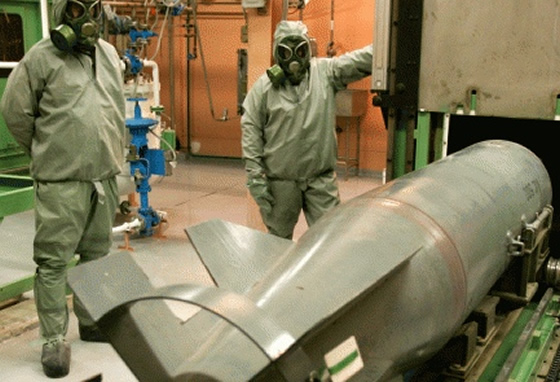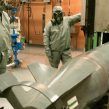
Kazakhstan Offers to Dispose of Syrian Chemical Weapons
Publication: Eurasia Daily Monitor Volume: 10 Issue: 223
By:

On November 28, the deputy head of the Department for Multilateral Cooperation at the Ministry of Foreign Affairs of Kazakhstan, Anuar Tanalinov, said that his country was considering the possibility of taking part in the destruction of Syria’s chemical weapons. According to the Kazakhstani diplomat, Astana views the Middle East as “an area that should become free of all weapons of mass destruction,” especially in light of the ongoing Syrian civil war, which has already displaced over 2 million people, as the United Nations’ latest report said (Newskaz.ru, November 28).
Earlier, in mid-September 2013, Kazakhstan’s foreign ministry issued another statement hailing the placement of Bashar al-Assad regime’s chemical arsenal under international control. While it also underlined the necessity of rapidly holding the Geneva-2 peace talks between the Syrian government and the rebels, Kazakhstan has been continuously insisting on the unacceptability of any outside military involvement in the conflict. “Our country welcomes the restraint of the international community in this crisis situation, the objective assessment of which may only be made on the basis of UN experts’ final conclusions,” the ministerial statement further read (Kursiv.kz, September 12).
Kazakhstan’s proposal to assist the international community in disposing of Damascus’s chemical stockpiles actually comes after a refusal of Albanian authorities to offer their territory for the destruction of these weapons. On November 12, hundreds of ordinary Albanians marched across the capital city of Tirana up to the local United States embassy to protest their country’s tentative agreement to host Syria’s chemical weapons, mostly on environmental grounds. Back in 2007, Albania already did away with its own 16-ton arsenal after receiving technical and financial assistance from Washington. While other countries are said to be currently under review as potential candidates, no detailed information has been revealed so far on such a politically sensitive issue. In this context, Kazakhstan may well attempt to propose its good offices in this intricate matter (Rbc.ru, November 15; Radio Azattyq, November 12).
Kazakhstan has increasingly been worried about the Syrian conflict’s eventual security implications not only for the Middle East region but also for the neighboring Caucasus and Central Asia. In October 2012, Astana harshly condemned the shelling of villages on Turkey’s southern border from the adjacent Syrian territory. At the time, five Turks died and 11 others were left wounded after a series of attacks by unidentified perpetrators. Turkey has traditionally been Kazakhstan’s strongest ally in the Muslim world and its major economic and trade partner. The transformation of the Syrian civil war, which has largely been confined to Syria’s national borders from the outset, into a regional conflagration is viewed from Astana as a serious source of geopolitical instability (News.nur.kz, October 8, 2012).
Moreover, Kazakhstan also has been anxious about the ramifications of the conflict with regard to its own security. On October 20, several Kazakhstani media channels reported about the posting on YouTube of a short video telling about the purported presence of around 150 Kazakhstani nationals within the ranks of the Syrian rebels. Two days later, the country’s National Security Committee officially commented on these publications, saying that it could neither confirm nor disprove such allegations, even though the video itself was judged by the committee as a piece of foreign propaganda. On November 14, Kazakhstan’s Foreign Minister Erlan Idrissov stated that a special verification was under way to establish the identity of presumably radicalized Kazakhstani citizens participating in the Syrian conflict. However, according to the minister, the actual conditions on the ground seriously hampered the conduct of the above checks, thus promising no definitive results in the nearest future (Tengrinews.kz, November 14; Novosti Kazakhstan, October 22; News.nur.kz, October 20).
Aside from similar geostrategic considerations, Kazakhstan is widely known to eagerly lend its support to various initiatives aimed at preventing the use and proliferation of deadly weapons. Back in April 2009, the country first proposed to become a host nation for the world’s nuclear fuel bank, a facility that could allow third countries to access radioactive materials under strict international control. Earlier, in September 2008, the US government had pledged to offer over $50 million to launch a similar structure, only to be joined in a short period of time by such other countries as Norway and Kuwait. In June 2010, the chairman of Kazakhstan’s Atomic Energy Committee, Timur Zhantikin, said the nuclear fuel bank might store as much as 60 tons of low-enriched uranium. This September, the Kazakhstani foreign ministry further elaborated on this issue by reiterating that the fuel bank would not pose any threat whatsoever to either the environment or human health (Zakon.kz, October 16, 2013; June 9, 2010; Izvestia.ru, April 6, 2009).
While it is yet to be seen whether Kazakhstan will air concrete proposals concerning its direct involvement in the destruction of Syria’s chemical arsenal, to be completed by mid-2014, this Central Asian state has a highly positive non-proliferation track record. It ratified the Non-Proliferation Treaty (NPT) in December 1993 and joined the International Atomic Energy Agency (IAEA) the following February, before acceding in 2000 and 2007 to the UN conventions banning the production, use and storage of both chemical and biological weapons, respectively. Thus, Kazakhstan’s excellent reputation as a staunch supporter of non-proliferation in Central Asia, the post-Soviet space and the world may actually help Astana make its voice heard early next year on the Syrian chemical problem.




